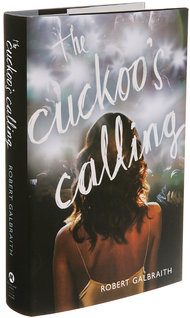Famed supermodel Lula Landry has plummeted to her death from her third-story balcony in what the police assume is a suicide. But three months later, her brother John Bristow seeks out private detective Cormoran Strike and presents some compelling evidence that Lula was actually murdered. Strike is warily convinced, but he desperately needs the money and so enters this world of models, designers, and film producers to discover the truth.
 By now we all know that The Cuckoo’s Calling was written by J.K. Rowling under the pseudonym Robert Galbraith. So much of the novel’s form and voice is reminiscent of Rowling’s writing (including the 5-part division that mirrors The Casual Vacancy); and Calling is filled with Rowling’s Dickensian character names—Rochelle Onafide, Freddy Bestigui, Kieran Kolovas-Jones. (Of course, it’s easy to see the similarities knowing Galbraith’s identity, but those few who read the book before his true identity leaked had no idea Rowling was behind it.) That being said, a hardboiled mystery novel would be a natural extension of Rowling’s writing abilities considering all the great mysteries that filled her Harry Potter series.
By now we all know that The Cuckoo’s Calling was written by J.K. Rowling under the pseudonym Robert Galbraith. So much of the novel’s form and voice is reminiscent of Rowling’s writing (including the 5-part division that mirrors The Casual Vacancy); and Calling is filled with Rowling’s Dickensian character names—Rochelle Onafide, Freddy Bestigui, Kieran Kolovas-Jones. (Of course, it’s easy to see the similarities knowing Galbraith’s identity, but those few who read the book before his true identity leaked had no idea Rowling was behind it.) That being said, a hardboiled mystery novel would be a natural extension of Rowling’s writing abilities considering all the great mysteries that filled her Harry Potter series.
Strike is a likable yet gruff protagonist with an intriguing backstory that is slowly revealed throughout the novel. More amusing is his temporary secretary Robin who fancies herself a detective as well, donning aliases and scouring the internet for clues (if you’ve ever wanted to be a sleuth, then you’ll easily identify with her). In fact, all of the characters in the novel are striking in their own way. Rowling vividly describes these characters while attributing recognizable accents and speech patterns (you’ll be thinking in a British accent by the time you finish this book).
The biggest problem with the novel is its length. At 450 pages, it seems to be exceptionally long for a mystery novel. But Rowling’s sprawling style is entertaining enough that you never really get bored reading it. It is also very dialogue heavy with so much of the story being revealed by Strike’s interviews with the various people in Lula’s life. Some find that problematic, but I greatly enjoy dialogue scenes and found it very enjoyable. (Until the end, when the dialogue-heavy climax feels clichéd and lazy.)
The style of The Cuckoo’s Calling is more reminiscent of Raymond Carver and Dashiell Hammett as opposed to contemporary crime fiction. It has a nostalgic air that adds to its appeal. This is the kind of mystery novel that would suck in many a reader, even those disinclined to read mystery/crime fiction.

